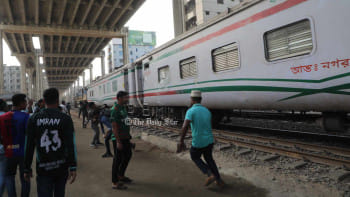1971: A New Horizon in History
"I could hear the incredible voice of Sheikh Muzibur Rahman, 'Make your homes forts. Fight with whatever comes handy. Our struggle will continue; this time the struggle is for our freedom; our struggle is for our independence!" These are words spoken by Mr. Sen, a Christian citizen of Pakistan, who is also a major character of Ekti Kalo Meyer Kotha (The Tale of a Dark Complexioned Girl), Tarashankar Bandopadhyay's novella, 1971. He came to Bangladesh during the liberation war of 1971 to collect information, and this is a part of his testimony. There were other foreigners like him who were mesmerized by the dream of freedom and the spirit of struggling Bengalis who had provided support to Bangladeshis then. Tarashankar Bandopadhyay, preeminent as a novelist in Bengali literature, presents this amazing tale by fusing emotions with realistic details. His book depicts rural Bangladeshi life during the liberation war. His heroine, Nazma, is representative of thousands of Bengali women of that period. Then there are also characters like Rahim, Mr. Sen and Chhaya, through whom the author presents a moving tale of 1971.
The other novella of the collection, Sutopar Toposya deftly deals with a complex issue. Through the letters of a young man to his wife it depicts the problematic political situation of West Bengal after 1965 and youth protests of that period.
Bandopadhyay wrote Ekti Kalo Meyer Kotha and Sutopar Toposya when close to dying. The sufferings of ordinary people are at the centre of both stories. In other words, despite their distinct settings, the two novellas are similar in narrating the misery of ordinary people, caught up in political events that traumatized them and appeared to be life-threatening. In depicting the tumultuous and terrifying aspects of 1971 the author has indeed done a magnificent job.
Emran Mahfuz is a poet and journalist.


 For all latest news, follow The Daily Star's Google News channel.
For all latest news, follow The Daily Star's Google News channel. 



Comments